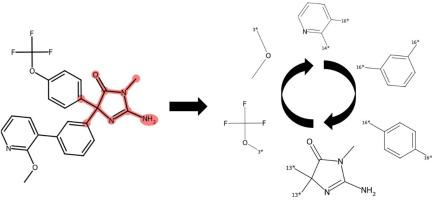MolAnchor method for explaining compound predictions based on substructures
European Journal of Medicinal Chemistry Reports
Pub Date : 2024-10-15
DOI:10.1016/j.ejmcr.2024.100230
引用次数: 0
Abstract
In medicinal chemistry, the impact of machine learning remains limited if predictions are not understood, which often precludes experimental follow-up. Therefore, chemically intuitive approaches that aid in model understanding and interpretation at the molecular level of detail are sought after. While feature attribution methods quantifying feature importance for model decisions are widely used in many areas, they must typically be combined with visualization techniques, if possible, to render the results accessible from a chemical viewpoint. On the other hand, there are approaches such as counterfactuals that yield closely related chemical structures with different prediction outcomes, providing direct access to structural features that critically influence model decisions. Herein, we introduce another approach designed to rationalize chemical predictions based on molecular structure. Therefore, we adapt principles underlying the anchor concept from explainable artificial intelligence (XAI) and alter them for molecular machine learning. The resulting method, termed MolAnchor, systematically identifies substructures in test compounds that determine property predictions, thus ensuring chemical interpretability. The MolAnchor methodology is made freely available to the medicinal chemistry community as a part of our study.

基于子结构解释化合物预测的 MolAnchor 方法
在药物化学领域,如果预测结果不被理解,机器学习的影响仍然有限,这往往排除了实验跟进的可能性。因此,在分子细节层面帮助理解和解释模型的化学直观方法受到追捧。虽然量化特征对模型决策重要性的特征归因方法在许多领域都得到了广泛应用,但如果可能的话,这些方法通常必须与可视化技术相结合,才能使结果从化学角度看更容易理解。另一方面,也有一些方法,例如反事实法,可以得到密切相关的化学结构,但预测结果却不同,从而直接获取对模型决策有重要影响的结构特征。在此,我们介绍另一种方法,旨在基于分子结构合理化化学预测。因此,我们调整了可解释人工智能(XAI)中锚概念的基本原理,并将其用于分子机器学习。由此产生的方法被称为 MolAnchor,它能系统地识别测试化合物中决定性质预测的子结构,从而确保化学可解释性。作为我们研究的一部分,MolAnchor 方法免费提供给药物化学界。
本文章由计算机程序翻译,如有差异,请以英文原文为准。
求助全文
约1分钟内获得全文
求助全文

 求助内容:
求助内容: 应助结果提醒方式:
应助结果提醒方式:


